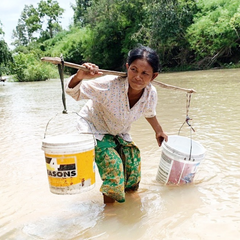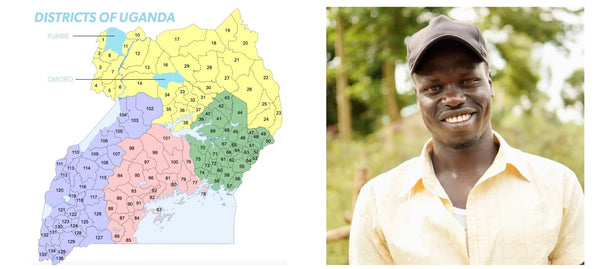When you wake up in the morning, where do you get water to brush your teeth, grab a glass to drink, and freshen up? For many, that looks like taking a few groggy-eyed steps to your bathroom.
nBut for 771 million people in the world, those steps are not so simple. Without access to clean water close in their home, women and children spend hours a day walking to find water. Consuming that dirty water can lead to diarrheal diseases, the second leading cause of death in children under age 5.
These stats paint a small picture of what the global water crisis looks like. Learn more about the crisis here.
 “Every day I spend too much time walking to collect water from the stream. Many of us are often sick. Collecting water, or being sick, take me away from working on the farm and time with my family.” – Mrs. Choem Saturn (Cambodia)n
“Every day I spend too much time walking to collect water from the stream. Many of us are often sick. Collecting water, or being sick, take me away from working on the farm and time with my family.” – Mrs. Choem Saturn (Cambodia)n
With these startling statistics, where do we even start in order to bring clean and living water to unreached communities worldwide? We start local.
Investing in a Regional Approach
In January 2021, for 14 areas across Cambodia, Chad, DRC, Ethiopia, India, Nepal, and Uganda, adding Niger in mid-2021.n
As we work through Christian partner organizations to fulfill each water project within a geographic region, we are able to concentrate our resources for the greatest impact. By the end of 2022, for example, our program will have increased in Yumbe District, Uganda, from 48% to 80%.
This is the power of focusing our efforts at a regional level.

The regions in Uganda you help us work in blue (right) and Patrick Acidri (left).
Because of the growing progress in Yumbe, we’re able to move forward with new work in the Omoro District. That’s where we partner with the only organization implementing a full (WASH) ministry in the area.
“When a well was drilled in this community, life returned to the people. God’s provision of the new hand pump opened doors and people have started attending small fellowships and Bible studies.” – Patrick Acidri (Uganda)
Expanding Into More Unreached Countries
In northern Niger, more than 10 million people are without clean water in Tibiri. That’s nearly half of Niger’s population. Through our regional strategy, we completed 47 community tap stands in 2021 and plan to complete 66 this year. These numbers propel us toward increasing water access for 140,000 people by December 2025.n
Though 771 million people might seem like an insurmountable number today, we’re committed to our mission: ending the global water crisis region-by-region and empowering the local church to share the good news of Jesus!
Join us in continuing to serve clean water until all are served. You can also visit Where We Work for more information about our approach, selecting locations, empowering the Church, and more.
 “Every day I spend too much time walking to collect water from the stream. Many of us are often sick. Collecting water, or being sick, take me away from working on the farm and time with my family.” – n
“Every day I spend too much time walking to collect water from the stream. Many of us are often sick. Collecting water, or being sick, take me away from working on the farm and time with my family.” – n
